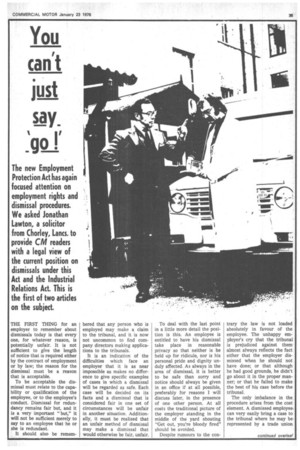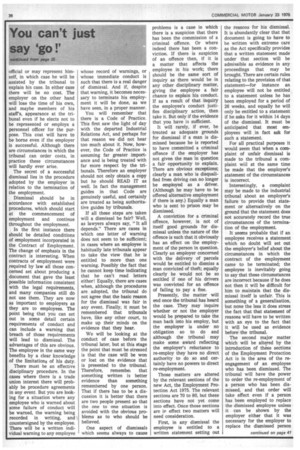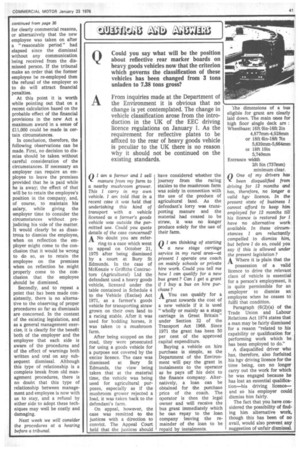You can't just say.
Page 37

Page 38

Page 43

If you've noticed an error in this article please click here to report it so we can fix it.
:go I'
The new Employment Protection Act has again focused attention on employment rights and dismissal procedures. We asked Jonathan Lawton, a solicitor from (honey, Lancs. to provide CM readers with a legal view of the current position on dismissals under this Act and the Industrial Relations Act. This is the first of two articles on the subject.
THE FIRST THING for an employer to remember about dismissals today is that every one, for whatever reason, is potentially unfair. It is not sufficient to give the length of notice that is required either by the contract a employment or by law; the reason for the dismissal must be a reason that is acceptable.
To be acceptable the dismissal must relate to the capability or qualification of the employee, or to the employee's conduct. Dismissal for redundancy remains fair but, and it is a very important "but," it will not be sufficient merely to say to an employee that he or she is redundant.
It should also be remem bered that any person who is employed may make a claim to the tribunal, and it is now not uncommon to find company directors making applications to the tribunals.
It is an indication of the difficulties which face an employer that it is as near impossible as makes no difference to give specific examples of cases in which a dismissal will be regarded as safe. Each case will be decided on its facts and a dismissal that is considered fair in one set of circumstances will be unfair in another situation. Additionally, it must be realised that an unfair method of dismissal may make a dismissal that would otherwise be fair, unfair. To deal with the last point in a little more detail the position is this. An employee is entitled to have his dismissal take place in reasonable privacy so that neither is he held up for ridicule, nor is his personal pride and dignity unduly affected. As always in the area of dismissal, it is better to be safe than sorry and notice should always be given in an office if at all possible, preferably for reasons I will discuss later, in the presence of one other person. At all costs the traditional picture of the employer standing in the middle of the yard shouting "Get out, you're bloody fired" should be avoided.
Despite rumours to the con trary the law is not loaded absolutely in favour of the employee. The unhappy employer's cry that the tribunal is prejudiced against them almost always reflects the fact either that the employer dismissed when he should not have done; or that although he had good grounds, he didn't go about it in the proper manner; or that he failed to make the best of his case before the tribunal.
The only imbalance in the procedure arises from the cost element. A dismissed employee. can very easily bring a case to the tribunal where he may be represented by a trade union official or may represent himself, in which case he will be assisted by the tribunal to explain his case. In either case there will be no cost. The employer on the other hand will lose the time of his own, and maybe members of his staff's, appearance at the tribunal even if he elects not to be represented or employs a personnel officer for the purpose. This cost will have to be borne even if the employer is successful. Although there are circumstances in which the tribunal can order costs, in practice these circumstances will hardly ever arise.
The secret of a successful dismissal lies in the procedure adopted by the employer in relation to the termination of the employment.
Dismissal should be in accordance with established procedures, which should start at the commencement of employment and continue throughout the employment In the first instance there should be detailed conditions of employment incorporated in the Contract of Employment. The change of emphasis in the contract is interesting. When contracts of employment were required by law all those concerned set about producing a document that gave the least possible information consistent with the legal requirements, and many companies still do not use them. They are now as important to employers as they are to employees. The point being that you can set out in some detail certain requirements of conduct and can include a warning that breach of those requirements will lead to dismissal. The advantages of this are obvious. The employee in the same way benefits by a clear knowledge of the limitations of his duty.
There must be an effective disciplinary procedure. In the cases where there is a trade union interest there will probably be procedure agreements in any event. But you are looking for a situation where any employee who is warned about some failure of conduct will be warned, the warning being recorded in writing, and countersigned by the employee. There will be a written individual warning to any employee whose record of warnings, or whose immediate conduct is such that there is a real danger of dismissal. And if, despite that warning, it becomes necessary to terminate his employment it will be done, as we have seen, in a proper manner.
You will remember that there is a Code of Practice. This first saw the light of day with the departed Industrial Relations Act, and perhaps for that reason we did not hear too much about it, Now, however, the Code of Practice is assuming far greater importance and is being treated with far more respect by the tribunals. Therefore an employer should not only obtain a copy but he should READ IT as well. In fact the management guides in that Code are genuinely useful, and certainly are treated as being authoritative guides by tribunals.
If all these steps are taken will a dismissal be fair? Well, as lawyers always say, "It all depends." There are cases in which one letter of warning does not seem to be sufficient; in cases where an employee is habitually late tribunals appear to take the view that he is entitled to more than one warning. Possibly the fact that he cannot keep time 'indicating that he can't read letters either! Equally, there are cases when, although the procedures are adopted, the tribunal do not agree that the basic reason for the dismissal was fair in any event. Finally, it must be remembered that tribunals have, like any other court, to make up their minds on the evidence that they hear.
We will be looking at the conduct of case before the tribunal later, but at this stage the point that must be stressed is that the case will be won or lost on the evidence that is presented to the tribunal. Therefore, remembei that something written is better evidence than something remembered by one person. That if there has to be a discussion it is better that there are two people present so that the one to one situation is avoided with the obvious problems as to who should be believed.
One aspect of dismissals which seems always to cause problems is a case in which there is a suspicion that there has been the commission of a criminal offence, Or where indeed there has been a conviction. If there is suspicion of an offence then, if it is a matter that affects the employee in his work; there should be the same sort of inquiry as there would be in any other disciplinary matter, giving the employee a fair chance to explain his conduct. If as a result of that inquiry the employee's conduct justifies disciplinary action, then take it. But only if the evidence that you have is sufficient.
It will rarely, if ever, be treated as adequate grounds for dismissal if a man is dismissed because he is reported to have committed a criminal offence if the employer has not given the man in question a fair opportunity to explain. There are obvious exceptions; clearly a man who is disqualified from driving can no longer be employed as a driver. (Although he may have to be offered alternative employment if there is any.) Equally a man who is sent to prison may be dismissed.
A conviction for a criminal offence, however, is not of itself good grounds for dismissal unless the nature of the offence is such that it obviously has an effect on the employment of the person in question. Clearly an employer concerned with the delivery of parcels would be entitled to dismiss a man convicted of theft; equally clearly he would not be so entitled if one of his drivers was convicted for an offence of failing to pay a fine.
Presently, the matter will end once the tribunal has heard the case. They may inquire whether or not the employer would be prepared to take the man back into his employ, but the employer is under no obligation so to do and although the tribunal may make some award reflecting the employer's reluctance to re-employ they have no direct authority to do so and certainly have no powers to direct re-employment.
Those matters are altered by the relevant sections of the new Act, the Employment Protection Act 1975. The relevant sections are 70 to 80, but these sections have not yet come into effect. Once those sections are ir effect two matters will need consideration.
First, in any dismissal the employee is entitled to a written statement setting out the reasons for his dismissal. It is abundantly clear that that document is going to have to be written with extreme care as the Act specifically provides that a written statement made under that section will be admissible as evidence in any proceedings that may be brought. There are certain rules relating to the provision of that statement—for instance an employee will not be entitled to a statement unless he has been employed for a period of 26 weeks, and equally he will only be entitled to a statement if he asks for it within 14 days of the dismissal. It must be anticipated that most employees will in fact ask for such a statement.
For all practical purposes it would seem that when a complaint of unfair dismissal is made to the tribunal a complaint will at the same time be made that the employer's statement of the circumstances is incorrect.
Interestingly, a complaint may be made to the industrial tribunal about an employer's failure to provide that statement or alternatively on the ground that the statement does not accurately record the true circumstances of the termination of the employment.
It seems probable that if an employee receives a statement which no doubt will set out the employer's belief about the circumstances in which the contract of the employment came to be terminated; the employee is inevitably going to say that these circumstances are incorrect because if he does not then it will be difficult for him to maintain that the dismissal itself is unfair. This is something of a generalisation, but none the less it does stress the fact that that statement of reasons will have to be written with an eye to the fact that it will be used as evidence before the tribunal.
The second major matter which will be altered by the introduction of these sections of the Employment Protection Act is in the area of the reengagement of an employee who has been dismissed. The tribunal will have the power to order the re-employment of a person who has been dismissed, and that order will take effect even if a person has been employed to replace the dismissed employee unless it can be shown by the employer either that it was necessary for the employer to replace the dismissed person for clearly commercial reasons, or alternatively that the new employee was taken on after a "reasonable period" had elapsed since the dismissal without any communication being received from the dismissed person. If the tribunal make an order that the former employee be re-employed then the refusal of the employer so to do will attract financial penalties.
At this point it is worth while pointing out that on a recent calculation based on the probable effect of the financial provisions in the new Act a maximum award in a sense of £11,000 could be made in certain circumstances.
In conclusion, therefore, the following observations can be made. First, no decision to dismiss should be taken without careful consideration of the circumstances. If necessary an employer can require an employee to leave the premises provided that he is paid while he is away; the effect of that will be to retain the employee's position in the company, and, of course, to maintain his salary, while giving the employer time to consider the circumstances without prejudicing his side of the matter. It would clearly be as disastrous to dismiss the employee, when on reflection the employer might come to the conclusion that it would be wrong to do so, as to retain the employee on the premises when on reflection he might properly come to the conclusion that the employee should be dismissed.
Secondly, and to repeat a point that has been made consistently, there is no alternative to the observing of proper procedures so far as dismissals are concerned. In the context of the existing legislation, and as a general management exercise, it is clearly for the benefit both of the employer and the employee that each side is aware of the procedures and of the effect of warnings both written and oral on any subsequent dismissal. Although this type of relationship is a complete break from old management procedures, there is no doubt that this type of relationship between management and employee is now with us to stay, and a refusal by either side to adopt these techniques may well be costly and damaging.
Next week we will consider the procedures at a hearing before a tribunal.
















































































